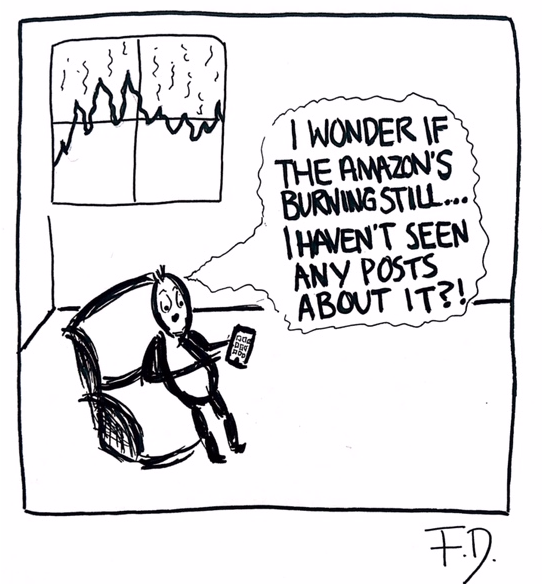Why is waste normal?
Humans are not inherently wasteful, yet our behaviour shift started to happen after WWII, as industry saw an opportunity to make profit gains quickly.
When I worked in a not-to-be-named supermarket a few years ago, I was exposed to the role of institutions in the production of waste. At the end of the day when the doors closed to customers, we moved in for the night shift to stock shelves and unsold fresh bakery goods were all thrown away every single night. The normalisation of this act was startling. Even more shocking to me was the fact that we meant to report any sightings of people trying to ‘steal’ the thrown-away goods from the rubbish bins overnight. It is scary to think that we live in a world in which using ‘unsellable’ food (potentially unsafe), is stealing. Furthermore, not only do we produce a lot of waste, but so often this waste cannot be used. In the UK this doesn’t just happen with food, but every single good, from dishwashers to cufflinks to potatoes.
Waste, as we know it, is a human concept. Humans are not inherently wasteful beings, yet our behaviour shift started to happen after World War 2, as the industry saw an opportunity to make profit gains quickly. How we saw our day to day items transformed by strong marketing initiatives of plastic and packaging industry. With the design of disposable plastics, the potential of high economic gain was too good for the production companies to resist, and so they began the trend that still permeates today. These companies contributed to designing the world today and the multitude of environmental and social problems within it. Supposed disposable plastic and other disposable objects, such as clothing, people began to buy more than they needed in what we now call overconsumption. The design of disposability for profit has shaped how we live and contributes to the crises we find ourselves in today.
We don’t think twice about buying a plastic bag. We use it for as long as it takes to get home, and then we throw it away, so often that this act is engrained in our muscle memory. We don’t consider how long it took to produce the bag, who made it or what pollution it may have caused in the process. Neither do we think about what happens to the bag once it is collected by our local council, for landfill or recycling. How long will the bag be around? Does it decompose, and what contamination might it cause in the process?
As recycling is such an institutionalised process, it takes the responsibility away from the producer. The normalcy of the act of recycling, as a natural occurrence to our modern existence, makes it seem simply part of our routine to buy disposable plastic because we can recycle it. Recycling also takes the guilt away from the supposed eco-conscious consumer.
The legacy of colonialism has led to those who contribute least to plastic pollution to bear the brunt of its after life
However, putting the focus on the consumer and municipal recycling infrastructures is precisely what the plastic-producing industry want us to do. The mega-producers of disposables design for mass-over-consumption, and we are now wired to buy into this, or we often have no other choice of product. Companies can make a higher profit if they offload their waste externalities onto the recycling system, which is an energy-using and pollution producing process and often leads to down-cycling, where materials are transformed into a product of lesser value than before. Furthermore, not everything that we put into recycling bins is recycled. A lot of what we separate into different bins at home and work, ends up in the landfill, often due to the complexity of the plastic product or the lack of infrastructure. Even more concerning is that many countries in the Global North, i.e. the USA and the UK, have been known to send their waste abroad to South East Asia, and to be building waste incinerators in the Global South too. The legacy of colonialism and imperialism has led to those who produce and profit from plastic pollution, not to bear the brunt of its after-life.
It is useful to frame the process of recycling as another way of disposal, which Dr Max Liboiron discusses at depth in her work on Discard Studies. A complete re-thinking of the way we design products and packaging is needed, highlighted by the work of The Slow Factory on ‘Waste Led Design Systems’ in which the end life of a product is considered from the beginning of the design process. I believe that there must be a shift in how we value objects, materials and labour, to reduce the production and consumption of disposable goods and to re-cultivate a re-use culture. Yet in the Global North, we feel entitled to our commodities, and few people are willing to give up this power and privilege.







